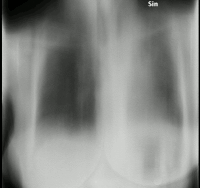
Endoscopic transorbital approach to anterolateral skull base through inferior orbital fissure: a cadaveric study
Sign Up to like & getrecommendations! Published in 2019 at "Acta Neurochirurgica"
DOI: 10.1007/s00701-019-03993-3
Abstract: Endoscopic transorbital approach (eTOA) has been announced as an alternative minimally invasive surgery to skull base. Owing to the inferior orbital fissure (IOF) connecting the orbit with surrounding pterygopalatine fossa (PPF), infratemporal fossa (ITF), and… read more here.
Keywords: anterolateral skull; base; endoscopic transorbital; skull base ... See more keywords

Biportal endoscopic transorbital approach: a quantitative anatomical study and clinical application
Sign Up to like & getrecommendations! Published in 2020 at "Acta Neurochirurgica"
DOI: 10.1007/s00701-020-04339-0
Abstract: Background We devised a biportal endoscopic transorbital approach (BiETOA) to gain surgical freedom by making a port for the endoscope and investigated the benefits and limitations of BiETOA. Methods A cylindrical port was designed and… read more here.
Keywords: biportal endoscopic; endoscopic transorbital; bietoa; transorbital approach ... See more keywords

A Side Door to Meckel's Cave: Anatomic Feasibility Study for the Lateral Transorbital Approach.
Sign Up to like & getrecommendations! Published in 2017 at "Operative neurosurgery"
DOI: 10.1093/ons/opx042
Abstract: BACKGROUND In the last decade, endoscopic skull base surgery has significantly developed and generated a plethora of techniques and approaches for access to the cranial ventral floor. However, the exploration for the least-aggressive, maximally efficient… read more here.
Keywords: meckel cave; study; approach; lateral transorbital ... See more keywords

Optimization of orbital retraction during endoscopic transorbital approach via quantitative measurement of the intraocular pressure – [SevEN 006]
Sign Up to like & getrecommendations! Published in 2021 at "BMC Ophthalmology"
DOI: 10.1186/s12886-021-01834-5
Abstract: Background Increased use of the transorbital approach (TOA) warrants greater understanding of the risk of increased intraocular pressure (IOP) and intraorbital pressure (IORP) due to orbital compression. We aimed to investigate the changes in IOP… read more here.
Keywords: intraocular pressure; orbital retraction; iop iorp; iorp ... See more keywords

The Transcaruncular Corridor of the Medial Transorbital Approach to the Frontal Lobe: Technical Nuances and Applications
Sign Up to like & getrecommendations! Published in 2023 at "Operative Neurosurgery"
DOI: 10.1227/ons.0000000000000658
Abstract: BACKGROUND AND IMPORTANCE: Medial orbital access through a transcaruncular corridor has yet to be fully characterized as a potential approach to intradural lesions within the skull base. Transorbital approaches present unique potential in the management… read more here.
Keywords: transcaruncular corridor; frontal lobe; approach; medial transorbital ... See more keywords